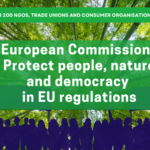- Gas package provides timid steps towards decommissioning fossil gas networks or reduced blending rates but fails to solve fundamental governance problems and to provide a systematic plan for a full fossil gas phase out by 2035
- Risk for the Renewables Directive to be twisted during final negotiations tomorrow to allow low carbon hydrogen (e.g. nuclear based)
Tuesday, 28th March 2023 – EU Energy Ministers adopted today their position on the Gas Package, excluding climate harming low carbon from the gas directive but displacing the “hot potato” to the Renewable Energy Directive (RED) which only moves the problem further down the road. The excluded article 8a attempted to allow low carbon hydrogen (fossil and nuclear based) to contribute to renewable hydrogen targets for transport and industry in the RED.
“Even though the rotten and legally disputable proposal to give low carbon hydrogen a seat in the ‘Gas package’ was avoided, the low carbon attack continues in the Renewable Energy Directive. The attempts to dismantle one of the main pillars of the ‘Fit for 55’ package will strongly jeopardise the threefold renewable energy deployment needed this decade”, said Esther Bollendorff, Gas Policy Expert at CAN Europe.
Since early stage discussions on the ‘Gas Package’, NGOs criticised the missing perspective to plan for a full fossil gas phase out across sectors by 2035. In the Council’s position today, there were only some light touch improvements regarding governance for future hydrogen and gas network planning, including a timid mention of decommissioning of gas networks, or reducing blending hydrogen to fossil gas to a maximum of 2%.
“The Council’s position on the gas package includes some cosmetic improvements but major governance questions such as the role of the fossil gas industry in planning networks remain open. A clear pathway for an EU wide fossil gas phase out to be achieved by 2035 is missing, thereby expanding the fossil gas industry’s lifeline, which is in stark contradiction to what’s needed in the triple fossil fuel, energy prices and climate crises we are in”, said Esther Bollendorff, Gas Policy Expert at CAN Europe.
Ministers also adopted the extension of last year’s agreed emergency gas demand reduction measure asking Member States to voluntarily reduce their gas demand by 15% between August 2022 and March 2023 compared to the average of the last five years. Eurostat figures however show that the EU’s gas demand fell by almost 20% between August last year and January 2023. This steep drop equates to 41,5 bcm, almost a third of the 155 bcm of Russian gas imported into the EU pre-war. The Commission published earlier last week a proposal to extend the 15% gas demand reduction target to March 2024. CAN Europe demands to increase this gas demand reduction target to at least 20% by March 2024 and make the objective binding. This would be a solid contribution to at least 50% gas demand reduction by 2030 as projected by ‘REPowerEU’ and towards a full gas phase out by 2035.
With today’s EU Council General Approach and the European Parliament’s position already adopted in February, the ‘Gas Package’ will move on to the final steps of the legislative process: the trilogues discussions between the Commission, the Parliament and the Council. A last opportunity for policymakers to increase the level of ambition on this file, and lay solid grounds for a genuine fossil gas phase out, in line with EU’s climate goals.
—ENDS—
Notes to editor:
- EU hydrogen and gas decarbonisation package (Commission’s final proposal on the Directive and Regulation; Parliament’s position on the Directive and Regulation)
- Media advisory on the Renewable Energy Directive 27/03/23
- NGO and stakeholders briefing on the EU Gas Package
- Joint renewable industry and NGO statement on low carbon
- Industry and NGO Letter: Building fit-for-purpose hydrogen infrastructure requires an independent body
- NGO Letter: ITRE Members must not delay further the European renewable hydrogen Delegated Act, 27/03/2023
- CAN Europe’s position paper on Fossil Gas
- CAN Europe’s position paper on Hydrogen
- CAN Europe’s Paris Agreement Compatible (PAC) scenario
Contact:
Nina Tramullas, nina.tramullas@caneurope.org



